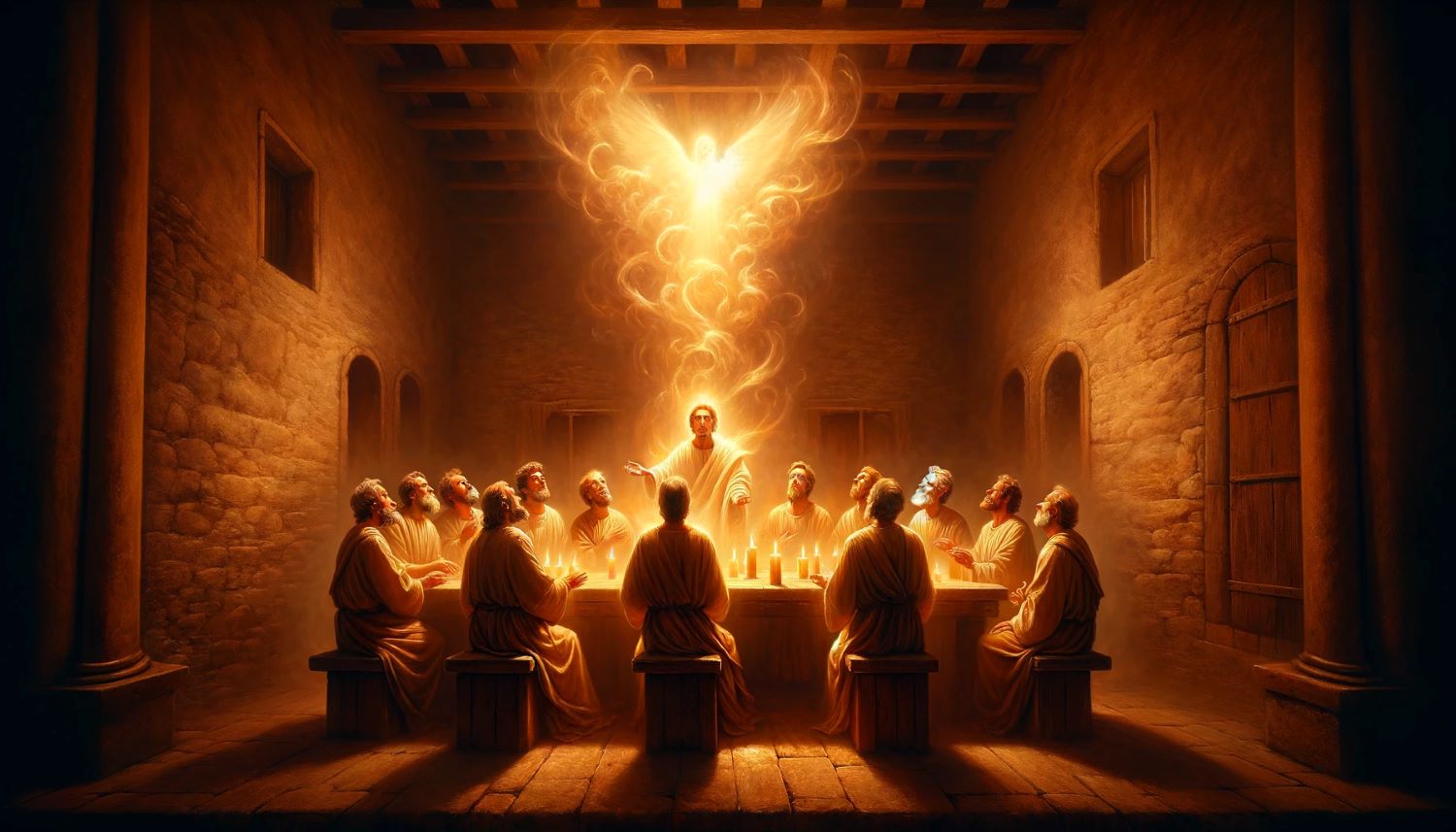Home>Bible Facts>When Did The Apostles Receive The Holy Spirit


Bible Facts
When Did The Apostles Receive The Holy Spirit
Published: February 22, 2024
Peter Smith, Editorial Director at Christian.net, combines deep insights into faith, politics, and culture to lead content creation that resonates widely. Awarded for his contributions to religious discourse, he previously headed a major organization for religious communicators, enhancing dialogue on faith's societal impacts.
Discover the truth about when the apostles received the Holy Spirit in this insightful exploration of Bible facts. Uncover the significance and implications of this pivotal event.
(Many of the links in this article redirect to a specific reviewed product. Your purchase of these products through affiliate links helps to generate commission for Christian.net, at no extra cost. Learn more)
Table of Contents
Introduction
The reception of the Holy Spirit by the apostles is a pivotal event in Christian history, marking the beginning of a new era in the spread of the gospel. This extraordinary occurrence, which took place on the Day of Pentecost, holds profound significance in the development of the early Christian church. Understanding the timing and circumstances surrounding the apostles' reception of the Holy Spirit provides invaluable insight into the spiritual dynamics that shaped the foundation of Christianity.
The account of the apostles receiving the Holy Spirit is deeply rooted in the rich tapestry of biblical history, intertwining divine promises, human anticipation, and the fulfillment of prophecy. This momentous event not only transformed the lives of the apostles but also ignited a spiritual revolution that reverberated throughout the ancient world and continues to impact believers today.
Delving into the details of this extraordinary event unveils the divine orchestration that underpins the Christian faith, illuminating the profound connection between the Old Testament prophecies and their fulfillment in the New Testament. The apostles' reception of the Holy Spirit serves as a powerful testament to the faithfulness of God and the fulfillment of His promises, underscoring the continuity of His redemptive plan throughout history.
As we embark on this exploration of the apostles' reception of the Holy Spirit, we will journey through the pages of Scripture to uncover the transformative power unleashed on the Day of Pentecost. This pivotal moment not only marked the birth of the Christian church but also set in motion a series of events that would forever alter the course of human history. Through a comprehensive examination of this foundational event, we will gain a deeper understanding of the profound impact of the Holy Spirit's indwelling presence in the lives of the apostles and the subsequent spread of the gospel message.
The apostles' reception of the Holy Spirit stands as a testament to the enduring relevance and transformative power of this divine encounter, serving as an enduring source of inspiration and spiritual empowerment for believers across generations. Join us as we embark on a journey to unravel the profound significance of this monumental event and its enduring impact on the Christian faith.
The Day of Pentecost
The Day of Pentecost holds a significant place in Christian tradition, marking the outpouring of the Holy Spirit upon the apostles and the birth of the Christian church. This momentous occasion, which occurred fifty days after the resurrection of Jesus, was steeped in profound symbolism and divine fulfillment. The term "Pentecost" itself is derived from the Greek word "pentēkostē," meaning "fiftieth," signifying the fiftieth day after the Passover.
The events of Pentecost unfolded in Jerusalem, where the apostles had gathered in obedience to Jesus' instruction to await the promised gift of the Holy Spirit. As they were united in prayer and anticipation, a sound like a mighty rushing wind filled the house where they were assembled. This extraordinary phenomenon was accompanied by the appearance of divided tongues of fire that rested upon each of them. These awe-inspiring manifestations served as tangible symbols of the Holy Spirit's arrival and the divine empowerment that was about to be bestowed upon the apostles.
The impact of this supernatural occurrence extended beyond the confines of the upper room, as a diverse multitude of devout Jews from various regions had converged in Jerusalem for the Feast of Pentecost. The miraculous outpouring of the Holy Spirit was not confined to the apostles alone but was made manifest in a manner that transcended linguistic and cultural barriers. Each individual present heard the apostles speaking in their own native language, a remarkable display of the universal scope of the gospel message and the inclusive nature of God's redemptive plan.
The profound significance of the Day of Pentecost lies in its role as the catalyst for the global expansion of the Christian faith. The indwelling of the Holy Spirit imbued the apostles with boldness, wisdom, and spiritual gifts, empowering them to fulfill the Great Commission and proclaim the gospel to the ends of the earth. This pivotal event marked the transition from a small band of followers to a dynamic, Spirit-empowered community that would ultimately impact the course of human history.
The Day of Pentecost stands as a testament to the fulfillment of Old Testament prophecies, particularly the words of the prophet Joel, who foretold the outpouring of the Spirit upon all flesh. This divine manifestation validated the continuity of God's redemptive plan and inaugurated a new era of spiritual revelation and empowerment. The reverberations of Pentecost continue to resound throughout the annals of Christian history, serving as a timeless reminder of the transformative power of the Holy Spirit and the enduring impact of this historic event on the global spread of the gospel.
The Day of Pentecost remains a cornerstone of Christian faith, symbolizing the birth of the church and the indwelling presence of the Holy Spirit in the lives of believers. This extraordinary outpouring of the Spirit not only emboldened the apostles but also laid the foundation for the ongoing work of the Holy Spirit in the lives of believers, empowering them to bear witness to the redemptive message of Jesus Christ.
The Promise of the Holy Spirit
The promise of the Holy Spirit, a profound and enduring pledge, serves as a cornerstone of Christian faith and a testament to the faithfulness of God. This promise, articulated by Jesus prior to His ascension, embodies the assurance of divine presence, empowerment, and guidance for believers. The anticipation of this extraordinary gift permeates the pages of the New Testament, underscoring its pivotal role in the spiritual journey of the early disciples and its enduring significance for all who profess faith in Christ.
The assurance of the Holy Spirit was articulated by Jesus during His earthly ministry, as recorded in the Gospel of John. In the poignant discourse with His disciples, Jesus promised to send the Holy Spirit as the Advocate, the Comforter, and the Spirit of Truth. This pledge of divine companionship and empowerment was not merely a fleeting assurance but a profound testament to the abiding presence of God in the lives of believers.
The promise of the Holy Spirit was intricately linked to the fulfillment of Old Testament prophecies, particularly the words of the prophet Joel, who foretold the outpouring of the Spirit upon all flesh. This prophetic anticipation underscored the continuity of God's redemptive plan and served as a harbinger of the transformative era inaugurated by the indwelling of the Holy Spirit.
The anticipation of the Holy Spirit's arrival imbued the disciples with a sense of expectancy and readiness, as they obediently gathered in Jerusalem, awaiting the fulfillment of Jesus' promise. This period of waiting, marked by prayer and unity, exemplified the disciples' steadfast faith and their recognition of the profound significance of the impending divine bestowal.
The promise of the Holy Spirit stands as a testament to the unwavering faithfulness of God and His commitment to equipping and empowering His people for the fulfillment of His redemptive purposes. This enduring pledge transcends temporal constraints, resonating across generations and serving as a source of hope, comfort, and empowerment for all who embrace the Christian faith.
The anticipation of the Holy Spirit's arrival imbued the disciples with a sense of expectancy and readiness, as they obediently gathered in Jerusalem, awaiting the fulfillment of Jesus' promise. This period of waiting, marked by prayer and unity, exemplified the disciples' steadfast faith and their recognition of the profound significance of the impending divine bestowal.
The promise of the Holy Spirit stands as a testament to the unwavering faithfulness of God and His commitment to equipping and empowering His people for the fulfillment of His redemptive purposes. This enduring pledge transcends temporal constraints, resonating across generations and serving as a source of hope, comfort, and empowerment for all who embrace the Christian faith.
The Apostles' Reception of the Holy Spirit
The apostles' reception of the Holy Spirit stands as a defining moment in the annals of Christian history, marking the fulfillment of Jesus' promise and the inauguration of a new era in the life of the early church. As the apostles gathered in the upper room in Jerusalem, united in prayer and anticipation, they became the recipients of an extraordinary outpouring of the Holy Spirit. This divine bestowal was accompanied by awe-inspiring manifestations, including the sound of a mighty rushing wind and the appearance of divided tongues of fire that rested upon each of them.
The indwelling of the Holy Spirit imbued the apostles with a profound sense of empowerment, equipping them with spiritual gifts, boldness, and wisdom to fulfill their mission of proclaiming the gospel to the ends of the earth. This transformative encounter not only emboldened the apostles but also served as a catalyst for the global expansion of the Christian faith. The indwelling presence of the Holy Spirit catalyzed a radical transformation in the lives of the apostles, empowering them to become bold and articulate witnesses of the redemptive message of Jesus Christ.
The apostles' reception of the Holy Spirit transcended the confines of a mere personal experience, as it marked the birth of the Christian church and the commencement of a dynamic, Spirit-empowered community. This pivotal event served as a testament to the fulfillment of Old Testament prophecies, particularly the words of the prophet Joel, who foretold the outpouring of the Spirit upon all flesh. The apostles' reception of the Holy Spirit validated the continuity of God's redemptive plan and inaugurated a new era of spiritual revelation and empowerment.
The impact of the apostles' reception of the Holy Spirit reverberated far beyond the walls of the upper room, igniting a spiritual revolution that would ultimately reshape the course of human history. The indwelling of the Holy Spirit empowered the apostles to transcend linguistic and cultural barriers, enabling them to effectively communicate the gospel to a diverse multitude gathered in Jerusalem for the Feast of Pentecost. This remarkable display of the universal scope of the gospel message underscored the inclusive nature of God's redemptive plan and served as a harbinger of the global spread of the Christian faith.
The apostles' reception of the Holy Spirit stands as a timeless testament to the enduring relevance and transformative power of this divine encounter. This extraordinary outpouring not only emboldened the apostles but also laid the foundation for the ongoing work of the Holy Spirit in the lives of believers, empowering them to bear witness to the redemptive message of Jesus Christ. The apostles' reception of the Holy Spirit serves as an enduring source of inspiration and spiritual empowerment for believers across generations, exemplifying the profound impact of the Holy Spirit's indwelling presence in the lives of the apostles and its enduring significance for the global spread of the gospel.
The Impact of Receiving the Holy Spirit
The impact of receiving the Holy Spirit reverberates throughout the annals of Christian history, shaping the trajectory of the early church and leaving an indelible imprint on the global spread of the gospel. The transformative encounter with the Holy Spirit imbued the apostles with a profound sense of empowerment, catalyzing a radical shift in their lives and igniting a spiritual revolution that would ultimately reshape the course of human history.
The indwelling of the Holy Spirit empowered the apostles with spiritual gifts, wisdom, and boldness, enabling them to fulfill their mission of proclaiming the gospel to the ends of the earth. This divine empowerment transcended linguistic and cultural barriers, equipping the apostles to effectively communicate the redemptive message of Jesus Christ to a diverse multitude gathered in Jerusalem for the Feast of Pentecost. The universal scope of the gospel message, manifested through the apostles' ability to speak in the native languages of those present, underscored the inclusive nature of God's redemptive plan and served as a harbinger of the global spread of the Christian faith.
The impact of receiving the Holy Spirit extended beyond the apostles' immediate sphere of influence, permeating the fabric of the early Christian community and catalyzing a dynamic, Spirit-empowered movement. The indwelling presence of the Holy Spirit marked the birth of the Christian church, inaugurating a new era of spiritual revelation and empowerment. This transformative encounter not only emboldened the apostles but also inspired and empowered the early believers, fostering a vibrant community characterized by unity, spiritual fervor, and a fervent commitment to the advancement of the gospel message.
The enduring impact of receiving the Holy Spirit is evidenced in the exponential growth of the early church and the steadfast perseverance of the apostles and early believers in the face of persecution and adversity. The indwelling presence of the Holy Spirit served as a source of comfort, guidance, and empowerment, enabling the early Christians to navigate the challenges and trials inherent in their proclamation of the gospel. This divine empowerment fueled a spirit of boldness and resilience, emboldening the apostles and early believers to stand unwavering in their faith and bear witness to the transformative power of the gospel message.
The impact of receiving the Holy Spirit transcends temporal constraints, resonating across generations and serving as a timeless testament to the enduring relevance and transformative power of this divine encounter. The apostles' reception of the Holy Spirit stands as an enduring source of inspiration and spiritual empowerment for believers across generations, exemplifying the profound impact of the Holy Spirit's indwelling presence in the lives of the apostles and its enduring significance for the global spread of the gospel.
Conclusion
The apostles' reception of the Holy Spirit stands as a watershed moment in the narrative of Christian faith, marking the fulfillment of Jesus' promise and the birth of the early Christian church. The extraordinary outpouring of the Holy Spirit on the Day of Pentecost catalyzed a transformative shift in the lives of the apostles, empowering them with spiritual gifts, wisdom, and boldness to embark on their mission of proclaiming the gospel to the ends of the earth. This pivotal event not only validated the continuity of God's redemptive plan, as foretold in the Old Testament prophecies, but also inaugurated a new era of spiritual revelation and empowerment.
The impact of receiving the Holy Spirit extended far beyond the confines of the upper room in Jerusalem, permeating the fabric of the early Christian community and igniting a dynamic, Spirit-empowered movement. The indwelling presence of the Holy Spirit fostered a vibrant community characterized by unity, spiritual fervor, and a resolute commitment to the advancement of the gospel message. The apostles and early believers, emboldened by the Holy Spirit, navigated persecution and adversity with unwavering faith, standing as enduring examples of the transformative power of the gospel message.
The enduring impact of the apostles' reception of the Holy Spirit is evidenced in the exponential growth of the early church and the enduring legacy of spiritual empowerment that continues to resonate across generations. The indwelling presence of the Holy Spirit serves as a timeless testament to the enduring relevance and transformative power of this divine encounter, inspiring and empowering believers to bear witness to the redemptive message of Jesus Christ.
As we reflect on the apostles' reception of the Holy Spirit, we are reminded of the profound significance of this historic event and its enduring impact on the global spread of the gospel. The indwelling of the Holy Spirit empowered the apostles to transcend linguistic and cultural barriers, effectively communicating the universal scope of the gospel message. This pivotal moment not only marked the birth of the Christian church but also set in motion a series of events that would forever alter the course of human history.
The apostles' reception of the Holy Spirit stands as a testament to the faithfulness of God and the fulfillment of His promises, underscoring the enduring relevance and transformative power of this divine encounter. This extraordinary outpouring not only emboldened the apostles but also laid the foundation for the ongoing work of the Holy Spirit in the lives of believers, empowering them to bear witness to the redemptive message of Jesus Christ. The impact of the apostles' reception of the Holy Spirit serves as an enduring source of inspiration and spiritual empowerment for believers across generations, exemplifying the profound significance of the Holy Spirit's indwelling presence in the lives of the apostles and its enduring significance for the global spread of the gospel.














